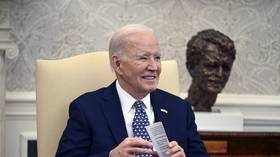It’s time for cognitive tests for US presidential candidates

With American voters increasingly of the opinion that neither President Joe Biden nor his potential general election rival, Donald Trump, are mentally fit to lead the nation, it’s time to set some tough restrictions on the highest office in the land.
At a time when the American people need strong and vibrant leadership more than ever before, they are forced to choose between two politicians whose combined age is 158 years. Already the oldest president in US history, Biden is 81 and would be 86 should he complete a second term. Trump, the probable Republican presidential nominee this year, will turn 78 in June.
According to a Quinnipiac University poll published this week, 64% of respondents said Joe Biden, the man who manages the nuclear briefcase, among other daunting tasks, is mentally unfit for another term, while 51% of voters voiced the same opinion about Donald Trump.
The shocking poll results came shortly after Special Council Robert Hur, presiding over a case to determine if the US president had mishandled classified documents, described Biden as “a sympathetic, well-meaning, elderly man with a poor memory.”
Biden’s legal team called that description of the US commander-in-chief “inappropriate.”
“I’m well meaning, and I’m an elderly man, and I know what the hell I’m doing,” Biden told reporters in a heated news conference at the White House. “My memory is fine.”
What came next, however, strongly suggested otherwise.
After defending his cognitive condition, the flustered leader apparently confused the US border crisis for one in the Middle East, as he referred to Egyptian President Abdel Fatah El-Sisi as the “president of Mexico.”
“As you know, initially, the president of Mexico Sisi did not want to open up the gate to allow humanitarian material to get in [to Gaza]. I talked to him. I convinced him to open the gate,” the president said.
If Biden hoped to mitigate voters’ concerns about his age and mental condition, he failed miserably.
Since then, Biden’s age and related mishaps have been under closer scrutiny than ever, and several such incidents came over the following weeks – such as when Biden tripped not once but twice as he attempted to board Air Force One for a flight to California, or when he confused Gaza and Ukraine when announcing the recent aid airdrop.
With the US presidential election just nine months down the road, 84 House Republicans penned an open letter demanding that Biden submit to a cognitive test to prove his mental fitness, or face impeachment under the 25th Amendment. At the same time, Dr. John Gartner, a renowned mental health expert, confided in an interview with Salon that while Biden is merely “ageing,” former President Trump “is dangerously demented.”
For whatever reason, in no other occupation do people resist the temptation to retire more than in the jungle of US politics. Indeed, despite America’s deceptive reputation as a youthful and dynamic nation, that image does not carry over into the realm of politics, where 105 lawmakers are over the age of 70. The median age for House legislators is 57.9, and in the Senate, the median age is 65.3 years, thus comprising one of the oldest legislative bodies in the free world. Yet none of these aging individuals are required to prove that they are still fit for the job.
It’s worth noting that among the 46 individuals who have served as commander-in-chief since George Washington’s election on April 30, 1789, it wasn’t until Dwight D. Eisenhower, who was elected on January 20, 1953, that America had its first 70-year-old leader in the Oval Office. And just barely. Eisenhower, who was first elected when he was 62 years old, left office when he was 70 years, 98 days old.
The Founding Fathers were insightful enough to set a minimum age requirement on political service, yet failed to do the same for a maximum requirement – probably due to the fact that few people lived into their 70s and 80s at the time. Now that many Americans can expect to live a long life, the US government has turned into a gerontocracy, with all of the risks and embarrassments that it entails.
How to fix the situation? One way would be to follow the same procedures that some 30 states have imposed on motorists, which mandate extra testing when a person reaches an advanced age. After all, it goes without saying that steering the nation is no less serious an activity than steering an automobile.
The statements, views and opinions expressed in this column are solely those of the author and do not necessarily represent those of RT.















